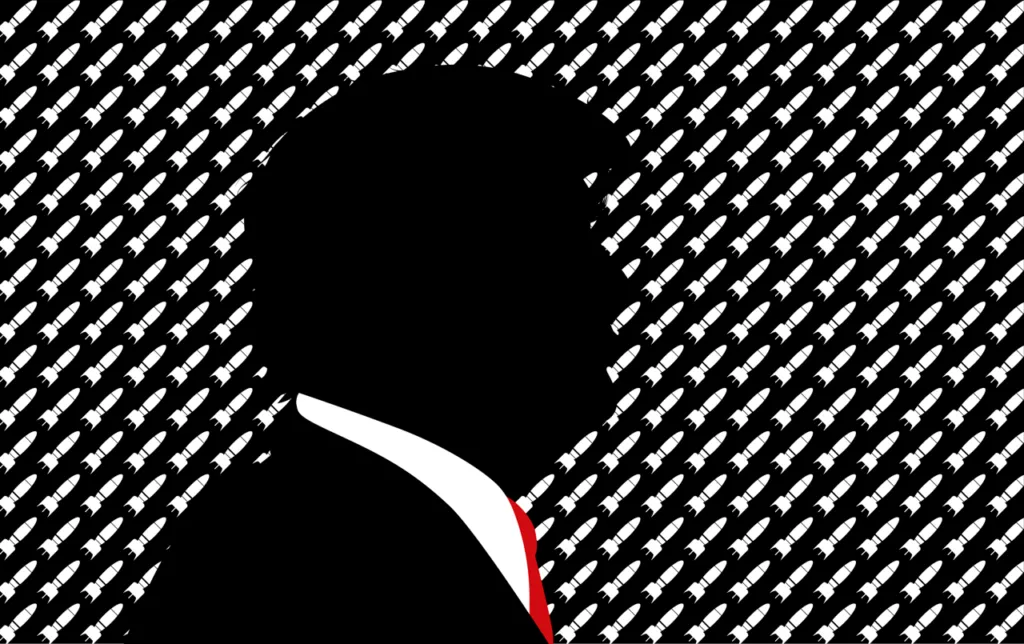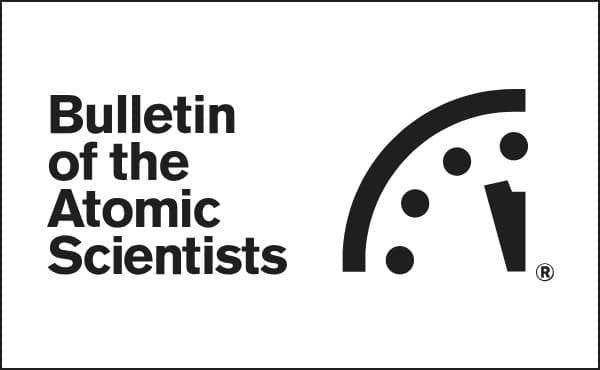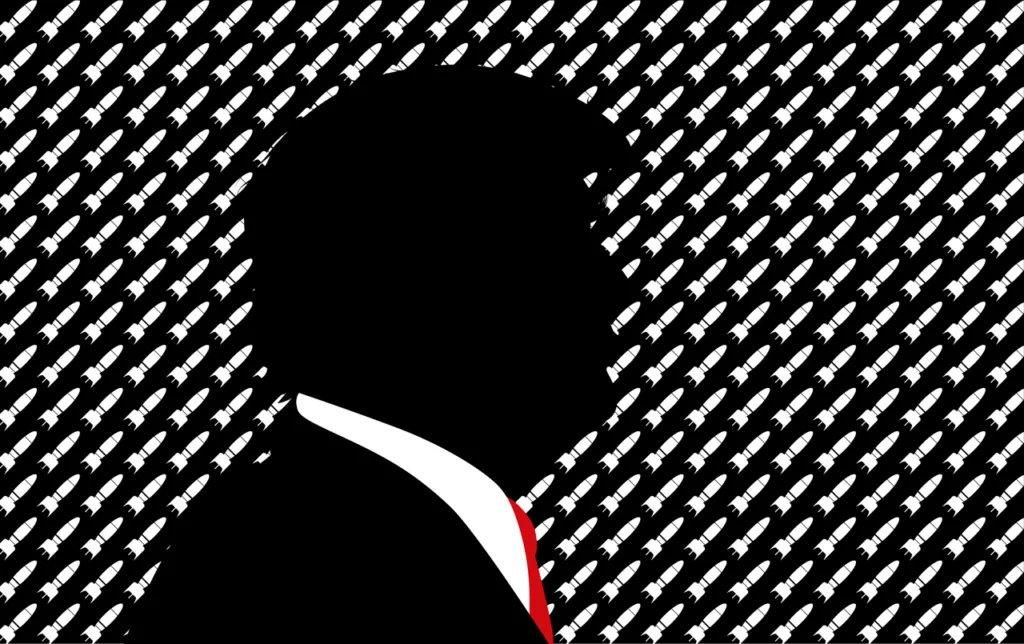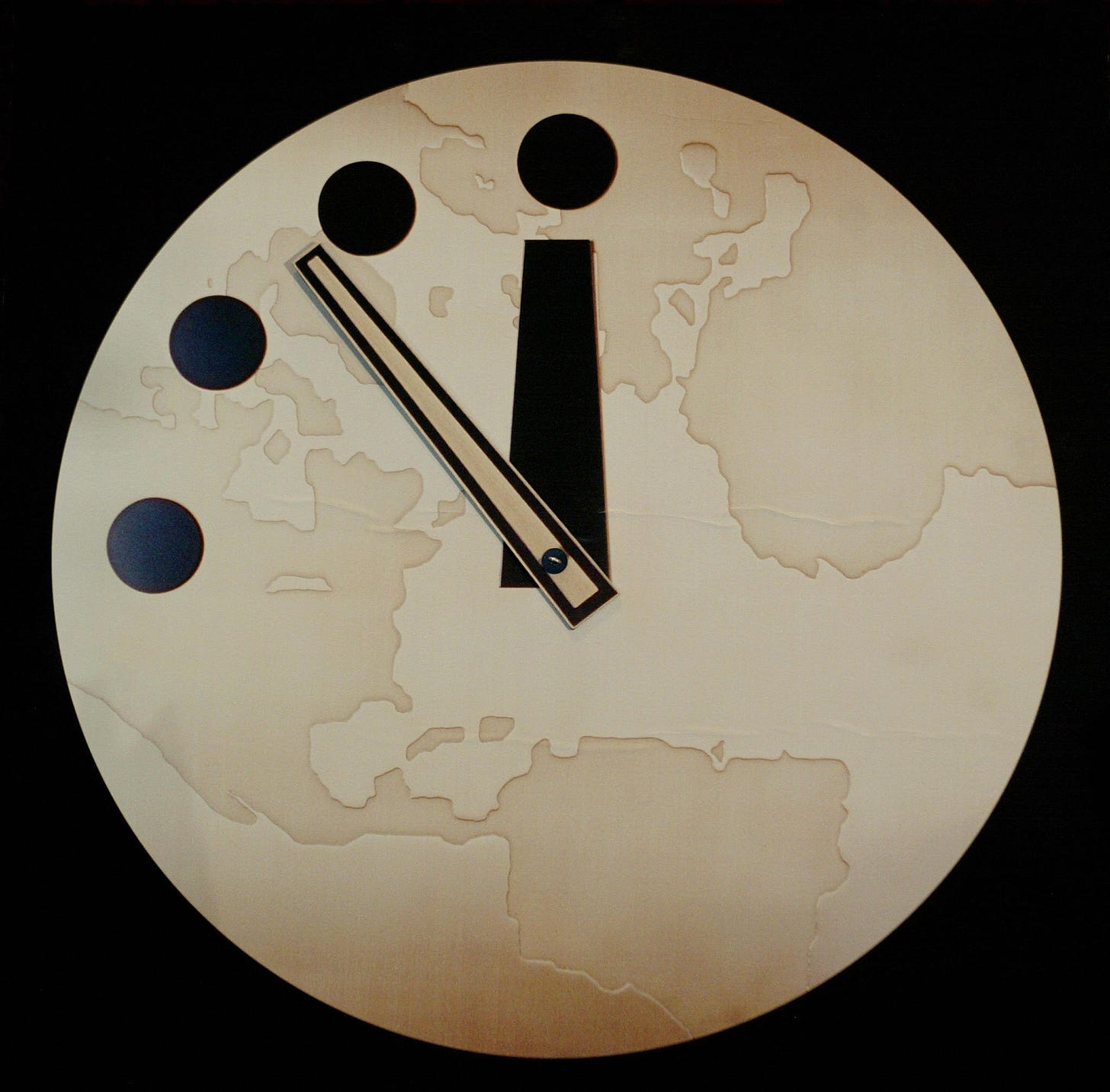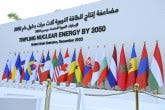LLAW’s All Things Nuclear #805, Friday, (11/08/2024)
“End Nuclear Insanity Before Nuclear Insanity Ends Humanity” ~llaw
Illustration by Thomas Gaulkin / klyona / valeo6 / depositphotos.com
LLAW’s NUCLEAR VIEWS, ISSUES & COMMENTS, Friday, (11/08/2024)
Following, from the “Bulletin of Atomic Scientist” is the new revelation-like document (or nuclear bible) that will begin carrying us through the next four years of Donald Trump and his merry band of Nazis. Note that the story refers to Trump as an authoritarian or fascist, which is absolutely not a complimentary tag for a sitting American president.
As I have stated and re-stated many times over the past two-plus years, the survival of us all including Mother Earth herself is in dire danger of extinction, and the insane election of Donald J. Trump as our next president is impossible to reconcile in my own mind and prompted me to almost say, “to hell with it”, and shut myself down from this daily “All Things Nuclear” blog. But after a restless night it occurred to me that this is a bad time to give up because the chances of nuclear war have just spectacularly elevated, increased by a minimal and overly optimistic 10% with Trump at the helm of the United States of America. ~llaw
As an aside, I am making some improvements and adjustments to the blog, some of which will be integrated over time, but I will immediately do away with posts on Saturday and Sunday in order to protect and preserve my mental and physical health (I will turn 83 years old on the 23rd of this month, so I have earned a day or two off each week.)
What to expect from Trump’s second term: more erratic, darker, and more dangerous
By François Diaz-Maurin | November 7, 2024
Illustration by Thomas Gaulkin / klyona / valeo6 / depositphotos.com
Those who managed to see Trump’s strategic plan for the country through the smoke screen of his brash and boisterous campaign should feel privileged. But most of us—including myself—are still trying to figure out what to make of Trump’s nationalist and isolationist grumbling in his off-script rallies, and whether he’ll stick to a Project 2025 template that the candidate distanced himself from during the campaign, but now his supporters say is the agenda.
The uncertainty does not exist only in the United States. Officials and analysts the world over wonder what Trump’s “peace through strength” approach means, and what they should expect from an erratic and unpredictable president-elect who may not have a concrete plan—or even “the concept of a plan”—for dealing with allies and adversaries.
Will Israel feel emboldened to extend its war to the Middle East? Should Europe worry about the United States reducing, or even ending, military aid to Ukraine? Should China prepare for a new confrontation with Washington? These are only a few of the many questions that have emerged from this year’s US presidential election outcome.
To help understand what the next four years may bring, I invited nuclear policy and security experts to share their views on what a Trump second term could look like—to the extent it is even possible to make any prediction. What they share paints a bleak picture of the US nuclear and foreign policy landscape—possibly with some bright spots and opportunities for increased stability.
Their responses have been lightly edited for length and clarity.
–François Diaz-Maurin
A dire global fallout
The global implications of the US election result cannot be overestimated. Choosing a leader to navigate the United States and the world through this time of global turmoil was critically important. As a friend recently put it to me, it’s as though the entire world has been waiting on the results of a biopsy. With the results in, the prognosis is dire. The United States, once a beacon of democratic values and practices, withers further into political chaos, and its influence in much of the world wanes at the same time that the nuclear threat increases. If left unchecked, a Trump administration’s policies will only increase this threat.
For the first time since the Cold War, the United States is poised to increase the number of its nuclear weapons. A Trump administration is likely to spend up to $2 trillion on the US nuclear arsenal in the coming decades. There is also a good chance that a shifting US policy toward Ukraine will allow Russian President Vladimir Putin to get away with nuclear blackmail, that Iran will become the world’s 10th nuclear-armed state, and that we’ll experience increased confrontation with China. A Trump administration will also almost certainly push for the resumption of nuclear weapons testing, normalizing what was unthinkable for decades and catalyzing the new nuclear arms race.
The next four years will be one of defending progress previously made, preventing bad trends from becoming worse, and laying the groundwork for when the moment is right to make transformational change.
–Emma Belcher, Ploughshares
A darker, more dangerous future
Americans have elected the first openly fascist president in US history. He will use his unchecked power to accumulate great wealth; policy will be a secondary consideration. Trump’s presidency will set back global responses to the climate crisis (a crisis he denies); weaken and perhaps collapse the US alliance system as allies find themselves standing alone against a rising authoritarian tide; fatally wound Ukraine’s defense against Russian imperialism; and give Israel’s government a blank check to pursue its wars. Social programs will be slashed while military budgets could soar. Defenses against pandemics will weaken.
The most serious—though not the most immediate—consequence of giving unchecked power to an unstable, unhinged man is that Trump will have the unfettered ability to launch nuclear weapons whenever he wants, for whatever reason. Americans may forever regret their failure to reform this outdated system of nuclear command and control when there was still a chance.
–Joseph Cirincione, nuclear policy analyst and author
Erosion of international norms
In terms of strategic consequences, the biggest immediate impact of Trump’s election will be on Ukraine and NATO, where Trump will likely seek to reduce or even end military support to Ukraine while putting pressure on Ukraine and Russia to negotiate a ceasefire. In such a deal, Russia would likely retain control over the roughly 20 percent of Ukrainian territory that it seized through force, and Ukraine would likely have to commit to not joining NATO. This would be an unpalatable outcome for many in the West, although, at this point, Ukraine has little prospect of winning back its eastern territory in what has become a costly and damaging war. Trump’s decision to wield his significant leverage by cutting support to Ukraine will force European NATO allies to foot more of the bill for Ukraine’s defense—as well as their own—to deter future Russian predations. Whether the other 31 NATO countries can step up to the plate with increased defense spending and whether they will remain unified in the face of Trump’s more transactional approach to alliances remains to be seen. Despite some pragmatic reasons for ending the war in Ukraine, a downside is that a negotiated ceasefire would erode the important international norm that territory cannot be acquired through the use of force.
The US presidential candidates are not confronting the nuclear threat that haunts the world
Israeli Prime Minister Benyamin Netanyahu and his right-wing governing coalition will also benefit from Trump’s election, at great cost to a democratic Israel in the long run. While Trump has said that he wants Netanyahu to “wrap up” the Gaza war by the time Trump takes office in January, his election will also greenlight Israel’s ethnic cleansing of Palestinians and resettlement of northern Gaza, as well as possible Israeli annexation of the West Bank. This will cement Israel’s trajectory as an ethnonationalist apartheid state. Both the Palestinians and Israeli democracy will be among the big losers of Trump’s election.
–Nina Tannenwald, senior lecturer in political science at Brown University
A cloud with some silver lining
There were not many reasons to be optimistic about world affairs before the US elections. Now, after Trump’s victory, there are even fewer. It is very easy to come up with a list of issues that could go wrong—from the war in Ukraine to nuclear proliferation and arms control. Finding something positive is much more difficult, but one can think of a silver lining to this cloud. No one should seriously expect the Trump administration to stop the war in Ukraine in 24 hours. But if it tones down the “strategic defeat” rhetoric in its relationship with Russia, it could be a step in the right direction. This could also help salvage what is left of the nuclear arms control process or at least reach an understanding, maybe informal, on some restraints.
But it could easily go the other way.
There has been talk in the United States about resuming nuclear tests or getting into an arms race with China. Some countries are openly discussing the idea of getting nuclear weapons if they lose US protection. The United States is a key player in the existing nuclear order and its actions—or inactions—can do a lot of damage. But other countries have agency too, and they should not give up on that order easily. Institutions must be protected, laws and norms universally applied, and commitments honored. Resigning themselves to US disengagement and unpredictability should not be an option.
–Pavel Podvig, physicist and independent analyst with the Russian Nuclear Forces Project
Unfinished business
Nuclear arms control and nonproliferation are in for a rough ride over the next four years. Neither will likely be a priority for a second Trump administration but instead could be bargaining chips for other things Trump may want, such as in his relationships with Russia or China. US pressure to end Israel’s assault on Gaza and Russia’s invasion of Ukraine will have long-lasting impacts on the risks that nuclear weapons pose.
Trump is unlikely to reprise his nuclear diplomacy with North Korea, perhaps writing this off as a waste of time. Hopefully, he will avoid the nuclear tit-for-tat threat escalation of 2017. If, however, Trump sees North Korea as unfinished business, he may seek Vladimir Putin’s—not Xi Jinping’s—help this time in persuading Kim Jong-un to come to the table. Leverage on North Korea as a collateral benefit to a resolution on Ukraine is one potential outcome.
Having torpedoed the Iran nuclear deal in his first term, Trump will likely avoid negotiations with Iran in his second. Responding to Iranian provocations, however, will be unavoidable and carry nuclear risks. The fallout from other foreign policy thrusts—support for Israel and pressure on Ukraine—may increase proliferation pressures on Europe, where they have long lain dormant, and in the Middle East, where they are close to the surface. Trump 2.0 will likely pursue a nuclear relationship with Saudi Arabia.
Because of China’s nuclear buildup, Trump is unlikely to seek a follow-on agreement to New START, which expires in 2026. He may balk at the costs of building more US nuclear weapons, however. For better or worse, Putin could see both tactical and strategic advantages in promoting a New START-“lite” to rekindle his manipulative relationship with Trump.
–Sharon Squassoni, research professor of international affairs at George Washington University
Increased nuclear dangers
With the re-election of Donald Trump, nuclear dangers just became more dangerous. A bombastic, unpredictable, authoritarian Trump will again have sole authority to order the use of US nuclear weapons and control over the direction of nuclear weapons policy. The second Trump administration will likely bring in a group of opportunistic, loyalist appointees who have promoted foreign policies and nuclear weapons policies that would—if enacted—put the indispensable norms against nuclear proliferation, nuclear weapons use, threats of use, nuclear testing, and nuclear arms racing under stress like never before.
With the last remaining agreement limiting the massive US and Russian nuclear arsenals, New START, due to expire in February 2026, a dangerous three-way nuclear arms race that no one can win and no one can afford may follow. Previously, Trump and his advisors showed little capacity or interest in engaging in a new bilateral arms control framework. Nevertheless, maintaining caps on strategic nuclear arsenals, even by way of an informal agreement between Trump and Russian President Vladimir Putin, would serve US and global interests.
In the months ahead, responsible members of Congress, Western and non-nuclear weapon states, and civil society campaigners must find effective ways to reinforce the taboo against nuclear weapon use. As the US arms control community seeks to prevent the loss of key guardrails against nuclear catastrophe, we also need to be prepared to seize any opportunity to once again progress toward a world free of nuclear weapons.
–Daryl Kimball, director of the Arms Control Association
Skyrocketing defense budget spending
Congress drives bloated Pentagon spending just as much as the executive. Lawmakers routinely increase military spending beyond the president’s budget request, regardless of who is in the White House. Sen. Roger Wicker, a Republican from Mississippi, is set to chair the Senate Armed Services Committee, and he advocated for a $950 billion military budget in fiscal year 2025.
I would not be surprised to see the Pentagon base budget break the trillion-dollar threshold during the second Trump administration.
–Julia Gledhill, research associate at The Stimson Center
More confrontation with China
Trump’s victory is likely to intensify Beijing’s worst-case scenario planning and reinforce its perceived need to prepare for what Xi Jinping has described as “dangerous storms” in US-China relations. Anticipating a more confrontational US policy, including more systematic economic decoupling and a renewed focus on projecting power in the Asia-Pacific, Beijing’s response will likely emphasize “putting its own house in order” first. This will entail a stronger emphasis on China’s own power development and a cautious, risk-averse stance toward any US proposals related to military transparency, confidence-building, and arms control. Simultaneously, Beijing sees greater opportunities to strengthen economic ties with European countries that share its reservations about Trump’s “America first” approach and to consolidate its territorial claims within the First Island Chain, where US commitments to regional allies could become more ambiguous and conditional.
In response, South Korea—and potentially Japan—could engage in more serious internal debates about the need for indigenous nuclear capabilities. Should Trump support friendly proliferation as aligned with US interests, China’s immediate security environment would deteriorate significantly. Growing Chinese skepticism about US commitment to nonproliferation principles could, in turn, prompt Beijing to escalate countermeasures against the AUKUS alliance and bolster strategic cooperation with like-minded countries both within and beyond the Asia-Pacific region, deepening divisions within the international security order.
–Tong Zhao, senior fellow at the Carnegie Endowment for International Peace
There are 7 categories, with the latest addition, (#7) being a Friday weekly roundup of IAEA (International Atomic Energy Agency) global nuclear news stories. Also included is a bonus non-nuclear category for news about the Yellowstone caldera and other volcanic and caldera activity around the world that play an important role in humanity’s lives. The feature categories provide articles and information about ‘all things nuclear’ for you to pick from, usually with up to 3 links with headlines concerning the most important media stories in each category, but sometimes fewer and occasionally even none (especially so with the Yellowstone Caldera). The Categories are listed below in their usual order:
All Things Nuclear
Nuclear Power
Nuclear Power Emergencies
Nuclear War
Nuclear War Threats
Yellowstone Caldera (Note: There are no Yellowstone Caldera bonus stories available in this evening’s Post.)
IAEA Weekly News (Friday’s only)
Whenever there is an underlined link to a Category media news story, if you press or click on the link provided, you no longer have to cut and paste to your web browser, since this Post’s link will take you directly to the article in your browser.
A current Digest of major nuclear media headlines with automated links is listed below by nuclear Category (in the above listed order). If a Category heading does not appear in the daily news Digest, it means there was no news reported from this Category today. Generally, the three best articles in each Category from around the nuclear world(s) are Posted. Occasionally, if a Post is important enough, it may be listed in multiple Categories.
TODAY’S NUCLEAR WORLD’S NEWS, Friday, (11/08/2024)
All Things Nuclear
NEWS
What to expect from Trump's second term: more erratic, darker, and more dangerous
Bulletin of the Atomic Scientists
There has been talk in the United States about resuming nuclear tests or getting into an arms race with China. ... All rights reserved. Terms of ...
Vermont nuclear decommissioning panel hears about spent fuel storage efforts - WAMC
WAMC
The Vermont Nuclear Decommissioning Citizens Advisory Panel Federal Nuclear Waste Policy Committee met recently to hear about federal efforts to ...
What's really going on with data centers and nuclear? - Lexology
Lexology
... all of which we have written about previously. Tech is also looking at fusion energy options. While large tech companies like Google and Microsoft ...
Nuclear Power
NEWS
A tiny grain of nuclear fuel is pulled from ruined Japanese nuclear plant, in a step toward cleanup
Fox News
After spending months inside the ruins of a nuclear reactor at Japan's tsunami-hit Fukushima Daiichi plant, a robot has delivered a small sample ...
What the FERC Amazon data center slapdown means for nuclear - E&E News by POLITICO
E&E News
The commission's ruling against linking the technology giant's facility with a Pennsylvania reactor spurred a drop in nuclear stock prices.
Nuclear energy stocktake: Heading into COP29, finance lags behind ambitions
Clean Air Task Force
What's been accomplished to advance the promise of nuclear energy, and what still needs to happen as world leaders head to COP29 in Baku.
Nuclear Power Emergencies
NEWS
US grid monitor details build-out needed to battle blackouts - E&E News by POLITICO
E&E News
... nuclear reactors' worth of power ... Advanced switching technology would provide maximum capability to route power in emergencies.
Commissioners considering additional uses for Emergency Operations Center - WSJM
WSJM
cook-plant-23 · New resident inspector appointed for Cook nuclear power plant. Latest Videos. Used for the like, share, comment, and reaction icons.
Nuclear War
NEWS
Explainer: Why nuclear weapons will be on Trump's agenda | Reuters
Reuters
When he takes office in January, President-elect Donald Trump will inherit a raft of national security challenges, including major wars in Ukraine ...
South Korea says Seoul-Washington alliance will strike back if North Korea attempts nuclear attack
Reuters
South Korea President Yoon Suk Yeol said the country was prepared in its alliance with the United States to strike back if North Korea attempted a ...
What to expect from Trump's second term: more erratic, darker, and more dangerous
Bulletin of the Atomic Scientists
For the first time since the Cold War, the United States is poised to increase the number of its nuclear weapons. A Trump administration is likely to ...
Nuclear War Threats
NEWS
Explainer: Why nuclear weapons will be on Trump's agenda | Reuters
Reuters
Trump will have to manage the gravest tensions with Moscow in more than 60 years, in part fueled by Russian President Vladimir Putin's threats to use ...
What to expect from Trump's second term: more erratic, darker, and more dangerous
Bulletin of the Atomic Scientists
With the re-election of Donald Trump, nuclear dangers just became more dangerous. A bombastic, unpredictable, authoritarian Trump will again have sole ...
Lord Harries links nuclear to cyber threats - Church Times
Church Times
“I believe that the major threat at the moment is not the nuclear weapons of another state, but their capacity for cyberwarfare. Nuclear weapons are .
IAEA Weekly News
8 November 2024
Read the top news and updates published on IAEA.org this week.
8 November 2024
IAEA at COP29: Nuclear Solutions for Climate Change
As the world grapples with the escalating impacts of climate change, IAEA Director General Rafael Mariano Grossi will join global leaders and stakeholders at COP29, to highlight the vast potential of nuclear solutions for climate change mitigation, adaptation and monitoring. Read more →
7 November 2024
World Fusion Energy Group Kicks Off in Rome
The World Fusion Energy Group inaugural meeting, co-organized by the IAEA and Italy, highlighted the growing interest and progress in advancements in fusion technology to provide a clean, safe and limitless source of energy. Read more →
6 November 2024
Fusion Energy Momentum Highlighted at Ministerial Meeting Hosted by IAEA and Italy
Government ministers and senior officials from dozens of countries convened for the inaugural ministerial meeting of the World Fusion Energy Group today, underscoring the growing interest and progress in developing fusion technology to provide a clean, safe and limitless source of energy. Read more →
5 November 2024
COP29: Building on the Momentum from Dubai to Baku
With COP29 just around the corner, the focus on nuclear power and its potential continues to grow. Read about the increasingly prominent role nuclear power is playing in the clean energy transition. Read more →
4 November 2024
IAEA’s First Cuban Collaborating Centre for Coastal and Marine Health
The first IAEA Collaborating Centre for marine research in a small island developing state has been officially designated in Cuba. Read more →





